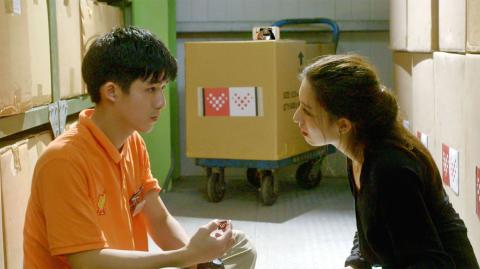Can Harry meet Sally and stay with her because of a “love patch,” which allows one to experience love within seconds? That and other questions on technology are raised in MeimeiWawa Multimedia’s recent bilingual YouTube film, Still Better than Love.
The Veronin sisters, Esther (梁妍熙) and Lara (梁心頤), who graduated from Taipei American School a decade ago, formed MeimeiWawa in 2013 and since then have been pushing the envelope. This film, entered in the 2016 Los Angeles Asian Pacific Film Festival, is their latest endeavor.
The sisters are by no means strangers in the arts. Esther, who now focuses on production, gave a powerful performance in LAB Space’s 2016 production of Wait Until Dark and Lara, a talented singer and performer, followed as the female lead in A. R. Gurney’s Love Letters. Their YouTube series Meiwa Diaries further present how art and exhibitionism playfully mix and infiltrate their own East-meets-West lives and identity.

photo courtesy of meimeiwawa
However, the focus is on technology in this film written and directed by Diane Kang (康黛安). Often cast as an innocent girl, Lara delighted in the chance to play a woman desperate for love and satisfaction opposite co-star Danny Lee (李博翔) who takes on the “innocent” role this time.
Lara’s chaaracter seeks guaranteed instant love with the “love patch” but at issue, as Lara succinctly puts it, is that “technology can aid our lives but also destabilize traditional life as we know it.”
One could be tempted to dismiss this work as far-fetched soft porn. However other past imaginative technologies of films like 2001 Space Odyssey (1968) and Westworld (1973) are now realities and our world is populated with all sorts of artificial intelligence including androids, drones, virtual reality and Japanese sex robots.
This film raises other tech issues as well. How often do we forego real communication while we seek likes and smiles from tweets, Facebook messages and Photoshopped Instagram images? The technology of social intelligence fosters such and makes it hard to distinguish true value. Thus the film’s crass closing scene with spectators taking photos and selfies of the couple’s passionate sidewalk romp hits close to home.
Still Better than Love makes us question what we settle for.
As for Lara, what’s next? In the fall, she will switch gears to put out a long overdue third album with songs on the many challenges contemporary women face combining career and family, lifestyle, fleeting youth — especially when the biological clock is ticking.

Jan. 26 to Feb. 1 Nearly 90 years after it was last recorded, the Basay language was taught in a classroom for the first time in September last year. Over the following three months, students learned its sounds along with the customs and folktales of the Ketagalan people, who once spoke it across northern Taiwan. Although each Ketagalan settlement had its own language, Basay functioned as a common trade language. By the late 19th century, it had largely fallen out of daily use as speakers shifted to Hoklo (commonly known as Taiwanese), surviving only in fragments remembered by the elderly. In

William Liu (劉家君) moved to Kaohsiung from Nantou to live with his boyfriend Reg Hong (洪嘉佑). “In Nantou, people do not support gay rights at all and never even talk about it. Living here made me optimistic and made me realize how much I can express myself,” Liu tells the Taipei Times. Hong and his friend Cony Hsieh (謝昀希) are both active in several LGBT groups and organizations in Kaohsiung. They were among the people behind the city’s 16th Pride event in November last year, which gathered over 35,000 people. Along with others, they clearly see Kaohsiung as the nexus of LGBT rights.

Dissident artist Ai Weiwei’s (艾未未) famous return to the People’s Republic of China (PRC) has been overshadowed by the astonishing news of the latest arrests of senior military figures for “corruption,” but it is an interesting piece of news in its own right, though more for what Ai does not understand than for what he does. Ai simply lacks the reflective understanding that the loneliness and isolation he imagines are “European” are simply the joys of life as an expat. That goes both ways: “I love Taiwan!” say many still wet-behind-the-ears expats here, not realizing what they love is being an

In the American west, “it is said, water flows upwards towards money,” wrote Marc Reisner in one of the most compelling books on public policy ever written, Cadillac Desert. As Americans failed to overcome the West’s water scarcity with hard work and private capital, the Federal government came to the rescue. As Reisner describes: “the American West quietly became the first and most durable example of the modern welfare state.” In Taiwan, the money toward which water flows upwards is the high tech industry, particularly the chip powerhouse Taiwan Semiconductor Manufacturing Co (TSMC, 台積電). Typically articles on TSMC’s water demand